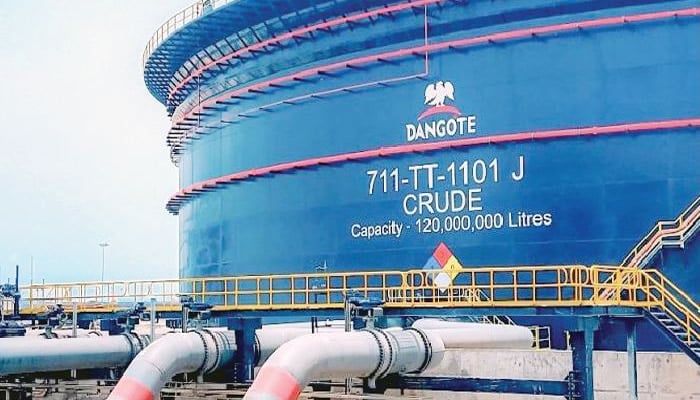Petroleum marketers in Nigeria may soon stop importing petrol as the Dangote Petroleum Refinery has slashed its ex-depot price by ₦49 per litre, a move that is already reshaping the country’s fuel market. The refinery, located in Lagos, now sells Premium Motor Spirit (PMS), popularly known as petrol, at ₦828 per litre, down from ₦877, representing a 5.6 per cent decrease. This marks Dangote’s second major price adjustment in three months as it continues to respond to market realities and domestic supply challenges.
The latest price cut, which took effect last Friday, comes at a time when the Federal Government’s 15 per cent import tariff on refined petrol is making fuel importation more expensive. Industry experts believe this combination of lower refinery prices and higher import duties could make petrol imports unviable in the short term.
The Executive Secretary of the Major Oil Marketers Association of Nigeria (MOMAN), Clement Isong, said Dangote’s new pricing strategy would naturally make imports unattractive. “It would stop imports now, definitely, since imports are higher than Dangote’s price. That is the logical thing,” he said.
Isong explained that private refiners like Dangote have the freedom to set prices based on import parity, which refers to the cost of importing fuel into the country. He said that import parity pricing varies depending on where the product is sourced, vessel size, and logistics costs. According to him, import costs differ between regions like Northwestern Europe and offshore Togo, and this variation can be influenced by economies of scale and port capacity.
He added, “Dangote, barring any regulatory intervention, can price his product any way he wants. He probably prices it for market reasons. Import parity is not one fixed number but a range of costs. Larger vessels and deeper port drafts reduce freight expenses, while smaller ones increase them. That’s how we determine the final cost of landing fuel in Nigeria.”
Isong also explained that Dangote Refinery is monitoring price trends and uses a 30-day average price to guide its adjustments rather than changing daily. “Dangote will not move his price every day. The gantry price is ₦828 and it has not changed. If the global spot prices keep rising, he will eventually increase his price, but for now, it is a competitive rate,” he noted.
Despite the optimism from major marketers, others have raised concerns about depending solely on local supply. The President of the Petroleum Products Retail Outlets Owners Association of Nigeria (PETROAN), Billy Gillis-Harry, cautioned that halting fuel imports entirely could lead to product shortages. He stated that local refining, including production from Dangote Refinery, currently meets only 30 to 35 per cent of national demand.
“Well, the imported products are currently augmenting what is produced locally. If imports stop now, there will be scarcity because Dangote’s production is not yet enough to satisfy national consumption,” he said.
Gillis-Harry confirmed that PETROAN members are already purchasing products from Dangote but complained about delays in loading at the refinery. “He is reducing prices, but our members are still waiting to load what they have paid for,” he added.
He also urged the Federal Government to reconsider the 15 per cent import tariff on refined products, arguing that the policy could discourage fuel availability. “Reducing the import tariff would ensure continued supply and stability in the market,” he said.
Reacting to claims that Dangote’s price cuts are designed to push importers out of the market, Gillis-Harry said such strategies are normal in a competitive environment. “It’s not surprising; it’s how business works. When the hunter learns to shoot, the bird learns to fly. The market will stabilise eventually,” he remarked, stressing that fuel importation cannot stop completely for now.
Meanwhile, new data from the Major Energies Marketers Association of Nigeria (MEMAN) shows that Nigeria’s import parity price for petrol has averaged ₦824.10 per litre over the past 30 days. The figure, compiled by S&P Global Commodity Insights, represents the real cost of bringing petrol into the country, factoring in exchange rates, freight, insurance, and port levies.
At the ports, the spot landing price stood at ₦830.80 per litre at the Nigerian Ports Authority and ₦830.82 per litre at the New Oil and Gas Free Zone, reflecting minor increases in logistics costs. In comparison, Dangote’s gantry price of ₦828 per litre remains slightly below the import parity level, making locally refined petrol cheaper for marketers.
Currently, retail pump prices range between ₦850 and ₦950 per litre across the country, depending on location and supplier. This represents a three to five per cent reduction from previous levels and could fall further if Dangote maintains consistent supply.
Industry watchers say the Dangote Refinery’s pricing strategy is reshaping the Nigerian downstream sector. If sustained, it could gradually push out importers while positioning the refinery as the dominant supplier of petrol in West Africa. However, until local refining capacity increases, fuel importation may remain an essential backup for national energy security.
